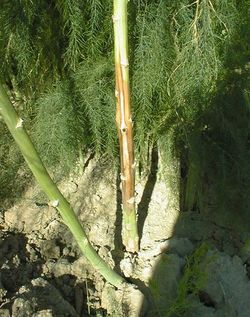Fusarium culmorum
From Pestinfo-Wiki
| Literature database |
|---|
| 629 articles sorted by: |
| • year (descending) |
| • research topics |
| • countries/regions |
| • host plants |
| • list of antagonists |

symptoms of Fusarium culmorum infection on asparagus stem (click on image to enlarge it)
Author: Rainer Wahl
Source: Hortipendium
Author: Rainer Wahl
Source: Hortipendium
Fusarium culmorum (W.G. Smith) Sacc. 1895
The fungus is widespread in temperate and subtropical regions and one of the species causing Fusarium head blight of wheat and other cereals (see also Fusarium graminearum). It can produce mycotoxins which may contaminate the grain. It also infects many other plants and can cause, for example, foot and root rots on beet and asparagus. Management relies on resistant cultivars.
It produces macroconidia (4-6 celled, about 30-50 x 5-7 µm large) and thick-walled, spherical chlamydospores (around 10-12 µm in diameter). Microconidia or sexual reproduction have not been observed.
| Vernacular names | |
|---|---|
| • Deutsch: | partielle Taubährigkeit Ährenfusariose |
| • English: | partial head blight Fusarium ear blight Fusarium head blight |
| • Français: | brûlure des épis |
